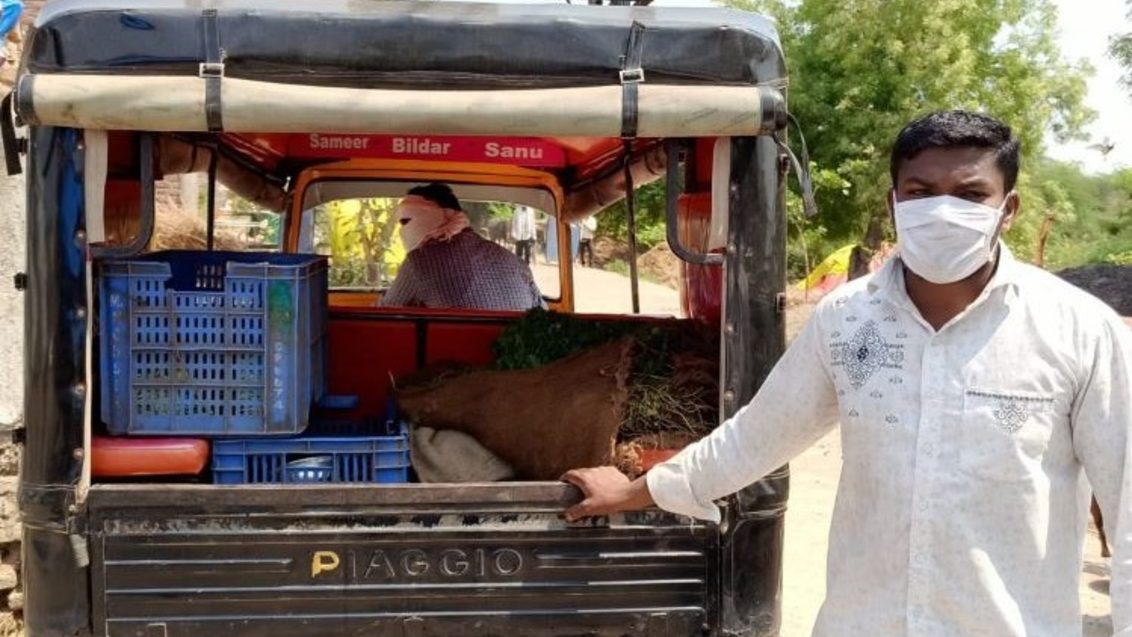Bringing relief to locked-down farmers

The COVID-19 pandemic has consequences far beyond viral infection. For many farmers, entire livelihoods are at stake. Our Indian agri-entrepreneurs (AEs) are helping in lots of different ways.
As the world battles the pandemic, businesses and working people everywhere face huge challenges. India is no exception. The economy is now grappling with a three-week lockdown. “Citizens’ solidarity has been remarkable”, says Sharan Ghai from our Agri-Entrepreneur Growth Foundation (AEGF)*. “The government is also helping in many ways, for example guaranteeing INR 500 to every worker in the Jan Dhan poverty alleviation program.”
AEGF is among the many organizations combatting the spread of the disease and helping those in need. “Our AEs are making society around them aware of the dangers, helping contain the virus, and also continuing business operations as well as possible”, Sharan explains.
As of mid-April, over 1500 AEs across nine states had got involved. Together they had reached over 327,000 smallholders in several thousand villages. “During this tough lockdown, they help by getting vegetables from the field to farmers’ homes, providing money to the distressed and guiding villagers to health checkups”, Sharan continues.
Crucially, the AEs are also working to maintain links to markets. Normally, this would be a high revenue period for farmers. They recently harvested the rabi season crops, so they have lots of products to sell. Most farmers, however, lack good storage facilities. So getting the product to customers is vital.
The AE assistance initiative has grown rapidly and found valuable allies. In Jharkhand, for example, AEGF and the Block District Officer (BDO) created a joint Awareness Against COVID-19 program. “The BDO asked us for beds for people in quarantine, lots of soap and masks, as well as a protein-rich diet for 85 patients”, Sharan reports. “The Jharkhand team responded immediately. AEs also provide village sanitization services and help farmers aggregate vegetables and sell them quickly. Several of them have even acquired special passes so they can volunteer for emergency services.” Jharkhand team members regularly check on farmers’ and each other’s health and guide any suspected cases towards medical assistance.
AEs in Maharashtra have also dug in to combat the pandemic. Vishvanath Lingade, Vitthal Kishan Puyed, and Shivraj Shelke, among 600 others, deliver vegetables to farmers and help out with funds where necessary. “They reach close to 200 families every day”, says Sharan Ghai. “These efforts have netted the farmers vegetable prices comparable to usual local markets. The continued sales links are a major relief for them.”
With companies such as Agri-Bazaar on board and continued marketing of products such as raisins, grapes, and jackfruit, farmers earn decent incomes even through the lockdown. For example, AEs in Jharkhand’s Torpa district procures jackfruit from farmers to sell at nearby markets. They collect the produce in their own vehicles and sell it in the state capital at good rates. Farmers get INR 12-13 per kilo, a real lifeline in these difficult times. AE Rishikesh Dhikale and his manager Kishor Shinde, for example, got government passes to provide essential food items. “We sold 2.2 tonnes of vegetables for farmers, despite the severe curfew and lockdown!”, says Kishor. All AEs naturally wear masks and sanitize their hands regularly.
Through these efforts, AEGF is not only contributing to the national fight against COVID-19 but also to ensuring smallholders’ well-being both now and after the lockdown.
Read how our teams in Indonesia and Kenya are tackling the crisis:
- Indonesia https://www.syngentafoundation.org/articles/agricultural/healthy-farmer…
- Kenya https://www.syngentafoundation.org/articles/agricultural/farmers-hubs-h…
- Bangladesh https://www.syngentafoundation.org/news/recent-news/fresh-produce-floods-and-video-calls
*The AEGF is a venture promoted by Syngenta Foundation India and Tata Trusts. It empowers young rural people to become catalysts of agricultural development in their local areas. AEGF trains them to become Agri-Entrepreneurs (AEs). The AEs then begin playing key roles in developing the agriculture of their home regions. This initiative brings together services previously often inaccessible to smallholders. These include credit, market links, access to high-quality inputs and farming advice.
